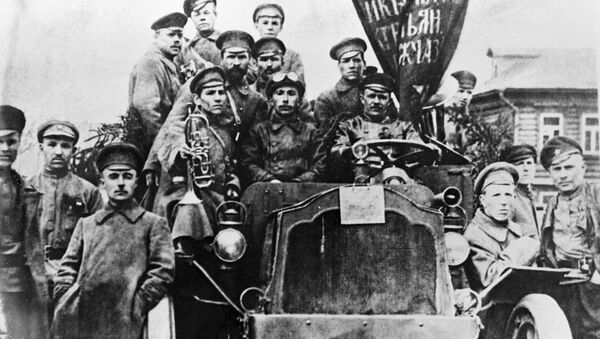MOSCOW, November 7 (RIA Novosti) — On Friday Russia marks the 97th anniversary of the 1917 Bolshevik Revolution with a multitude of performances, official events and historical reenactments.
On November 7 (Julian calendar, October 25), 1917, an armed uprising took place in Petrograd (Leningrad in 1924-1991, St. Petersburg since 1991). The Bolsheviks stormed the Winter Palace, arrested members of the Russian Provisional Government and proclaimed that, from then on, all power would belong to the Soviets (Councils) of Soldier, Worker and Peasant Deputies. The Soviet period of Russian history lasted over 70 years.
People began celebrating November 7 in 1918. In the USSR, it was the main holiday, called The Day of the Great October Socialist Revolution. During the times of Joseph Stalin, ruler of the country from 1922 until 1953, the holiday was formalized with demonstrations in Moscow and the appearance of Soviet leaders on the Lenin Mausoleum rostrum during military parades on the Red Square. For this purpose, the entrances to Red Square were rebuilt to allow military equipment to pass.
This tribute was observed faithfully for decades. Even on November 7, 1941 with the German army a mere 30 km from the gates of Moscow, a military parade was held on the Red Square, with Red Army regiments marching directly to the front after the event. The 1941 military parade boosted troop and civilian morale and resembled a large-scale military operation which, indeed, it was.
Perception and form of the celebration began to change in the 1970s. The October Revolution Day was no longer seen as a full-fledged holiday and gave way to the widely popular Victory Day and New Year celebrations. Corporate workers were selected to take part in November 7 marches but the military parade began losing its attraction as a younger generation of Soviet citizens became less interested in weapons and military equipment. Nonetheless, people were happy for this short two-day vacation (November 8 remained a holiday until 1992).
After the demise of the Soviet Union in 1991, Russian President Boris Yeltsin signed, on March 13, 1995, the Federal Law on Days of Military Glory (Remembrance Days) of Russia. This law, among other observances, proclaimed November 7 the Day of Liberating Moscow from Polish Invaders, a feat accomplished by the People’s Volunteer Corps commanded by Kuzma Minin and Dmitry Pozharsky. In his executive order of November 7, 1996, President Yeltsin renamed this holiday the Day of Accord and Reconciliation. The executive order notes that the 1917 October Revolution had drastically changed the destiny of Russia. “In an effort to prevent any future confrontation, to ensure the unity and consolidation of Russian society, I hereby resolve: 1. To proclaim November 7 the Day of Accord and Reconciliation. 2. To proclaim 1997, the year of the 80th anniversary of the October Revolution, the Year of Accord and Reconciliation,” the document reads, in part.
On December 29, 2004, Russian President Vladimir Putin signed Federal Law Amending Article 1 of Federal Law on Days of Military Glory (Remembrance Days) of Russia. The document that was enacted on January 1, 2005 proclaimed November 7 the Day of Russian Military Glory and the day of holding the military parade in commemoration of the legendary November 7, 1941 march on Moscow’s Red Square, marking the 24th anniversary of the Great October Socialist Revolution. The following paragraph — “November 4 is the National Unity Day” – was added to Article 2 of the Law.
Under Federal Law of December 29, 2004 Amending Article 112 of the Labor Code of the Russian Federation, November 7 ceased to be a holiday and was replaced with November 4, the National Unity Day.
On July 21, 2005, Russian President Vladimir Putin signed Federal Law Amending Federal Law on Days of Military Glory (Remembrance Days) of Russia. The new version of the Federal Law stipulated the days of Russian military glory and remembrance days commemorating the glorious victories of Russian forces that played a decisive role in the Russian history, as well as memorable dates in the history of the Fatherland linked with major historical events in the life of the country and in society. November 7, a memorable date, is named the 1917 October Revolution Day.
Moscow has hosted official events dedicated to the 1941 parade for over a decade. Various episodes of that military parade are reenacted, and theatrical performances presented. Historic military equipment is also displayed.
The November 7, 2014 celebrations will include a large theatrical performance involving 59 parade details. Soldiers wearing Red Army uniforms from World War II will reenact the capture of the Reichstag in Berlin in 1945.
Participants in the honored November 7, 1941 Moscow parade have pledged to visit the Red Square every year on that day, as long as they live. In the past ten years, veterans attending the event have been accompanied by their grandchildren and great-grandchildren.




